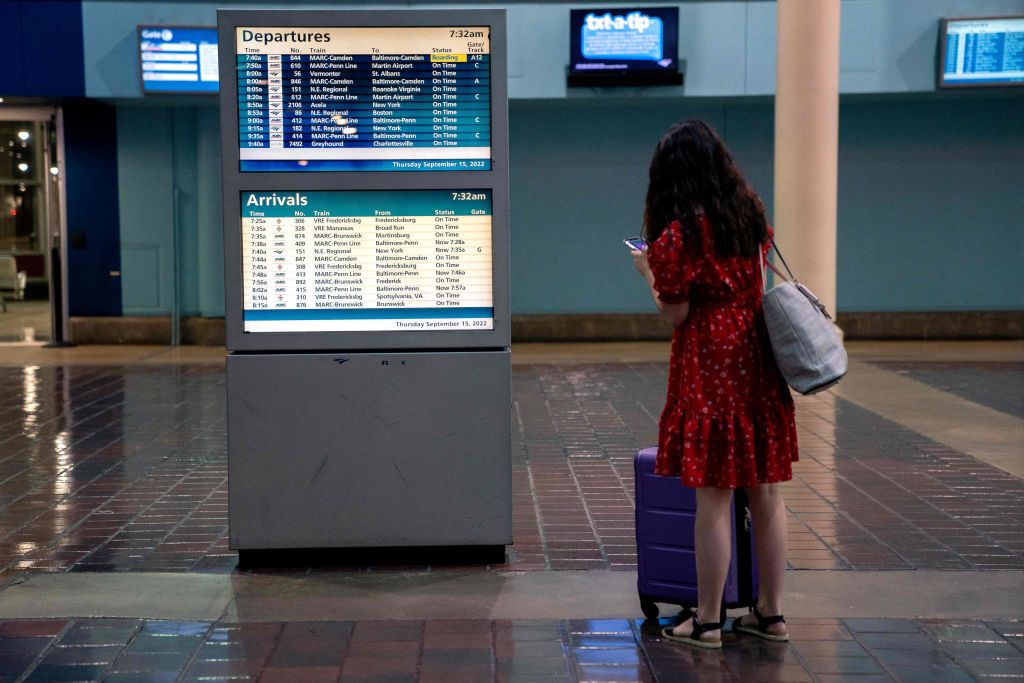House sends bill to avoid rail strike to Senate as Biden urges swift action


The House on Wednesday overwhelmingly cleared a bill that would enact a labor agreement between rail companies and their workers in hopes of avoiding an expensive and economically-devastating strike just before the holidays.
The legislation, which passed 290 to 137, forces the companies and their staff to follow the tentative agreement the White House helped broker back in September, when workers were striking over pay and scheduling, The New York Times reports. In addition to raises, that deal allowed workers to take unpaid days for doctors appointments without penalty, a change conductor and engineer unions had been advocating for. The agreement was ultimately rejected, however, and unions have threatened to strike unless a new deal is reached by Dec. 9.
To appease some Democrats, as well as address bipartisan concerns surrounding congressional intervention, the House also on Wednesday approved a separate provision adding seven days of compensated sick time to the deal; that measure passed "largely on party lines," per the Times.
Subscribe to The Week
Escape your echo chamber. Get the facts behind the news, plus analysis from multiple perspectives.

Sign up for The Week's Free Newsletters
From our morning news briefing to a weekly Good News Newsletter, get the best of The Week delivered directly to your inbox.
From our morning news briefing to a weekly Good News Newsletter, get the best of The Week delivered directly to your inbox.
The bill will now move to the Senate, "where leaders in both parties have indicated they would move quickly to avoid a disruption to the nation's rail service," the Times writes. That said, it's unclear whether the upper chamber will support the additional paid sick leave, which The Associated Press describes as a "major sticking point" in the negotiations between railroads and unions.
For his part, President Biden has implored the Senate to "act urgently" and send him the bill ASAP. "[W]ithout action this week, disruptions to our auto supply chains, our ability to move food to tables, and our ability to remove hazardous waste from gasoline refineries will begin," he said in a statement.
A free daily email with the biggest news stories of the day – and the best features from TheWeek.com
Brigid Kennedy worked at The Week from 2021 to 2023 as a staff writer, junior editor and then story editor, with an interest in U.S. politics, the economy and the music industry.
-
 Art review: Diane Arbus: Constellation
Art review: Diane Arbus: ConstellationFeature Park Avenue Armory, New York City, through Aug. 17
-
 July fiction: Summers to remember
July fiction: Summers to rememberFeature Featuring the latest summer-themed novels from Darrow Farr, Lucas Schaefer, and more
-
 Why are flash floods in Texas so deadly?
Why are flash floods in Texas so deadly?Today's Big Question Over 100 people, including 27 girls at a summer camp, died in recent flooding
-
 New tariffs set on 14 trading partners
New tariffs set on 14 trading partnersSpeed Read A new slate of tariffs will begin August 1 on imports from Japan, South Korea, Thailand and more
-
 New tariffs set on 14 trading partners
New tariffs set on 14 trading partnersSpeed Read A new slate of tariffs will begin on August 1, with rates ranging from 25% to 40% on imports from Japan, South Korea, Thailand and more
-
 Elon Musk launching 'America Party'
Elon Musk launching 'America Party'Speed Read The tech mogul promised to form a new political party if Trump's megabill passed Congress
-
 How will Trump's megabill affect you?
How will Trump's megabill affect you?Today's Big Question Republicans have passed the 'big, beautiful bill' through Congress
-
 Judge blocks Trump's asylum ban at US border
Judge blocks Trump's asylum ban at US borderSpeed Read The president violated federal law by shutting down the US-Mexico border to asylum seekers, said the ruling
-
 Thai court suspends prime minister over leaked call
Thai court suspends prime minister over leaked callSpeed Read Prime Minister Paetongtarn Shinawatra has been suspended, pending an ethics investigation
-
 Senate passes GOP megabill after Alaska side deal
Senate passes GOP megabill after Alaska side dealThe pivotal yes vote came from Sen. Lisa Murkowski, whose support was secured following negotiated side deals for her home state Alaska
-
 Trump sues LA over immigration policies
Trump sues LA over immigration policiesSpeed Read He is suing over the city's sanctuary law, claiming it prevents local law enforcement from cooperating with federal immigration authorities
